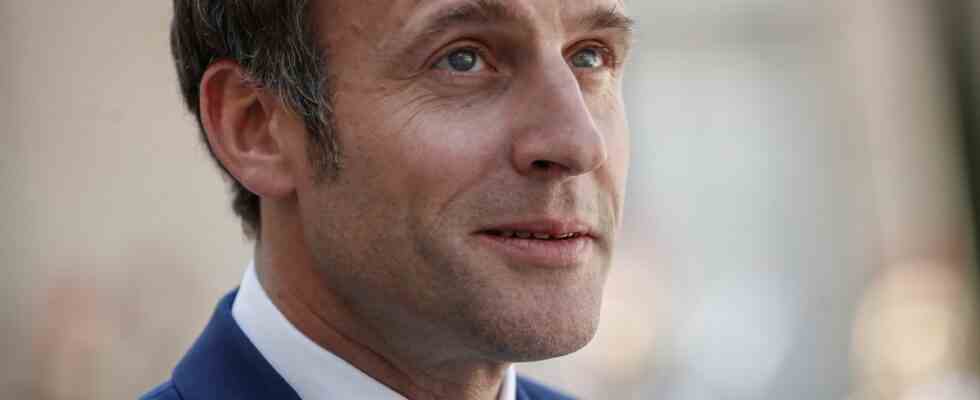It was early March, in one of his few public appearances before the presidential election, when French President Emmanuel Macron made his Plan to abolish the broadcasting fee announced. What in Germany probably breaking news would have been, one took note in France; was discussed more in specialist circles. This may have something to do with the fact that it is an old project from 2017 that Macron, who has since been confirmed in office, finally wants to implement – probably at the end of June, when the newly elected parliament will meet. In addition, the topic was lost in the election campaign.
Macron had moved there on purpose to avoid the lawsuit its competitors about the dwindling “purchasing power” of the French: He wanted the abolition of the contribution – 138 euros per household per year, obligatory for everyone who has a classic TV set – together with the associated housing tax to be understood as a social gesture.
When contributing, everyone has to pay the same amount, no matter how much they earn. Is that fair?
There’s a certain logic to that. The radio fee is “rather unpopular, but above all unfair,” said Olivier Dussopt, until recently Deputy Budget Minister, defending the idea. After all, everyone would have to pay the same amount, regardless of whether they earned 1,200 or 10,000 euros a month. From this point of view, it is actually fairer to finance the public service broadcasters through tax revenues, where higher earners also pay more.
According to the plan, France 2 to 5, Radio France, Arte France and foreign broadcasters such as TV5 Monde will in future receive their annual budget of currently 3.8 billion euros entirely from the state budget.
Sibyle Veil, head of the public radio station Radio France, warns that there should be “no doubts about our freedom, our party-political neutrality”.
(Photo: -/AFP)
The reaction was predominantly negative – and the criticism is aimed in two directions: On the one hand, authors, producers and the media themselves fear for reliable financing if the broadcaster’s budget gets caught up in the budgetary distribution struggle. The Macron camp countered the concern with the proposal that parliament could pass a financing law with a fixed multi-year financial framework, as in the case of the military or research – whether such a regulation would stand up to European competition law is of course a completely different question. Incidentally, a “sufficient” supply of the stations is also constitutionally secured.
How does the freedom of broadcasters change if they get their money directly from politicians?
More serious, however, is the fear of growing state influence, which would also hardly be transparent. Taxpayer funding “strengthens the link between government and the audiovisual sector,” says Laurent Lafon, an influential centrist cultural politician, that goes in exactly the wrong direction. Radio France boss Sybile Veil warned as a precaution that the new financing method should not leave “any doubts about our freedom, our party-political neutrality and our independence”.
Right-wing politician Éric Zemmour during the election campaign before a broadcast at the France 2 studios in Paris.
(Photo: STEPHANE DE SAKUTIN/AFP)
There is speculation that the executive could use money as a lever to interfere in the structure and content of broadcasting. Denmark serves as a cautionary tale: Since the decision in 2018 to replace the fees with tax financing, the public broadcasters there have come under strong pressure to save. Unsurprisingly, considerations of a major structural reform are now also appearing in France, for example in the form of a merger of all broadcasters into a kind of French BBC. Arte boss Bruno Patino already fears a budget cut. Its commercial-free Franco-German channel is financed to 95 percent from contributions. Several unions even see the “existence” of public broadcasting in danger and have called for a strike in Paris at the end of June.
Macron has made it clear that he is not happy with the state of public broadcasting. In 2017 he called him “the disgrace of the republic”. His spokesman later put it into perspective, meaning the poor management structures and the lack of adaptability, but the term stuck. The flagship France 2 complains that the head of state rarely grants him exclusive interviews. Relations are strained. In the Elysée, people are reassured that the president is dependent on the public broadcaster. However, the broadcasters are always under pressure to justify themselves.
Marine Le Pen thinks the abolition of the contribution is great
In terms of content, Macron’s critical attitude can hardly be justified. France’s public broadcasters deliver a solid programme, with the usual ups and downs. There is well-made news, with a striking number of excellent reports from the war in Ukraine. Culture and above all literature still have their place, formerly in apostrophestoday in La grande librairie. Radio station France Culture offers fantastic interviews and podcasts and is justifiably growing in popularity.
Attention is paid to balance, the speaking time of the candidates in the election campaign is meticulously regulated and measured to the second. Even right-wing politicians like Eric Zemmour or Marine Le Pen or right-wing conservative intellectuals have their say at length. Do the broadcasters still have a left twist, as the right regularly complain? A bit likely, by tradition, recently also as a counterweight to the various blatantly right-wing French private media owned by billionaires like Vincent Bollore.
In any case, the right-wing and state-critical camp is happy about the planned abolition of contributions, Le Pen thinks they’re great. But she not only wants to abolish the contribution, but the whole principle of public broadcasting.

